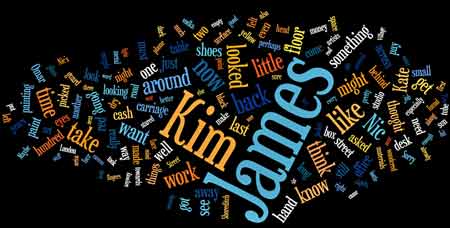For various reasons I’ve been incredibly pushed for time over the last week — principally related to a suspected outbreak of an unpleasant type of virus in the household. While it didn’t affect me directly, it had quite a knock on effect but I won’t go into the gory details. I was also quite addicted to watching every news programme and political discussion going that read the runes of the post-election negotiations — and I got most indignant at times about one potential outcome. Also, while it’s wonderful at this time of year, especially where I live, to see the trees coming into leaf and the days lengthening, it brings all kinds of tedious jobs in the garden like lawn mowing and weeding. I got nearly 200 little bedding plants delivered in plugs during the week which needed potting up, which I couldn’t do until this evening, so I lost quite a few. I also got five chilli plants delivered — one has the great name of ‘Bulgarian Carrot‘.
While I was otherwise occupied time was running short all week and I had a couple of novel course related pieces to produce. Most worrying was my looming tutorial with Alison on Monday for which I needed to send up to 3,000 words ‘by Friday’. I also have a major stage looming in my MSc dissertation and had to postpone my regular Skype chat with my supervisor by two days. I hastily revised the ‘problem overview’ section of the dissertation (2,000 words in all) and sent that off for review by Thursday afternoon (I’m very behind on that). This meant I had about 300 words written by about 3pm on Thursday for my tutorial. With the liberal assumption that ‘by Friday’ would mean by about 5pm on Friday I sat down to write a chapter as quickly as I could.
I wasn’t particularly well disposed to writing towards the end of the week. In Emily’s class we were reading extracts that we had potentially chosen for the evening event in June. I wasn’t sure what to use and hadn’t had time to write the Prologue idea (see previous posting). Alison had helpfully responded to an e-mail that I’d sent out bemoaning my inability to choose and she suggested a section from Chapter Two where Kim pelts Nic with paint from the roof of Village Underground. I quite like that bit too but it was over 900 words. I managed to pare it down to just under 700 in an editing session on Wednesday afternoon and then read it a few times for timing — marginally over 4 minutes.
Because of the virus issues, I had to miss the class I’ve started doing on Wednesday afternoons at City Lit and drive instead to London. I set off late and got stuck in traffic, due to an broken down horsebox, and then it took twice as long as on Monday to get from Finchley to Islington. So I arrived about 25 minutes late for a 90 minute class.
We had quite a few readings to hear and I happened to sit at the end of the row and was last in the reading order. I spent most of the class wondering if time would run out before it was my turn as well as being very impressed with the quality of the material that everyone else was reading. Some people read familiar stuff we’ve already heard and others read out reworked pieces that were significant improvements on the originals. A couple of people read completely new material — and it was all good — frighteningly so.
We ran out of time before Simon and I could read. I wasn’t in a particularly good mood anyway but I knew people had to have their tutorials so I asked Emily if I could mail the piece to her as I really wasn’t sure whether it was the right one. She then took pity on the two of us that hadn’t read and let us run on late. Simon read his novel’s opening of his — which had impressed us all the first time he’d read it.
I read mine but found what seemed to work ok on the page tripped me up as I read it out, although I’d generally managed it ok when I practised it — mainly stumbling over tongue-twisting alliteration. A few people in the class had read this chapter but most hadn’t — including Emily — so the location and situation were new to them as well as one character. I got a few laughs as I read, which was good, but the feedback afterwards seemed to be somewhat underwhelming. People seemed to think other scenes might be better. Emily said it was a good scene — very visual — but perhaps I should use something about when James and Kim go on a bender together — had I written that yet?
I came back home in a pretty foul mood. I think Emily had a good point about the choice of scene — I want something that features both my main characters — but I brooded over whether that meant I’d not yet written anything good enough to read out yet. The readings had also shown me how much progress other people were making on the course and made me think that somehow I was regressing. Almost as soon as I got home I went upstairs to bed and wouldn’t talk to anyone.
So I wasn’t in too much of a hopeful mood to set down writing for the tutorial the day afterwards — but nothing focuses me like a deadline. I wrote most of a first draft on Thursday night — about 2,000 words — then got up at 6am and added another 500 or so — and I added in the 300 I’d previously done. By 10am — when I Skype’d my MSc supervisor, I’d got a first draft of 2,800. I printed it out and made many corrections on hard copy then revised in Word. I then printed it out again, read it out loud, and did a further revision. By 3.45pm I was able to e-mail it off to Alison.
I was very pleased to have been able to write so quickly although in retrospect I think the piece is flawed by a few misjudgements about plot and tone more than there are problems with the writing. I ran the risk of planting issues in Alison’s mind before she read it by asking ‘is it too melodramatic?’, ‘are the main characters sympathetic?’, ‘is the balance between humour and dramatic action ok? ‘.  Some of the description is a bit clunky but what can I expect?
Part of the reason why I feel happier with the writing is that it’s moved back into a situation where I’m very at home — a pub. Kim works at a pub that I’ve based very closely on a spit-and-sawdust boozer in Hoxton that I’ve visited a few times, the last being a couple of months ago. I’ve tried to describe the varied clientele and the down-at-heel ambience. Before Kim goes in to work she winds James up by telling him he’ll be unwelcome if he looks like ‘a City arsehole’. He then asks her if it’s the Blind Beggar that she’s taking him to. This, unknown to Kim, is a pub notorious for its connections to the Kray twins (it’s also where the Salvation Army started, which is ironic for a novel about a pub) — click on the link to find out more.
This immediately made me think about how the Krays and their associates are such an ingrained part of popular folklore — but something that’s probably not very well-known to people who’ve only been in the country for the last few years. Even though the events were 45 years ago and these people were in reality unpleasant, violent criminals, the exotic names of some of the players in the Kray story have entered a collective cultural consciousness — Jack ‘the Hat’ McVitie is my favourite but also ‘Mad’ Frankie Fraser and ‘Nipper of the Yard’ (though he was on the good side).
In a section that no-one but me will probably like, but that cheered me up writing it no end, James reels off these bizarre nicknames to Kim, who is utterly bewildered. It also brings to mind the brilliant ‘Cockney Wanker’ cartoons in Viz which features some hideous East End boozer — which has two framed portraits on the wall — one of Winston Churchill and the other of Hitler.



